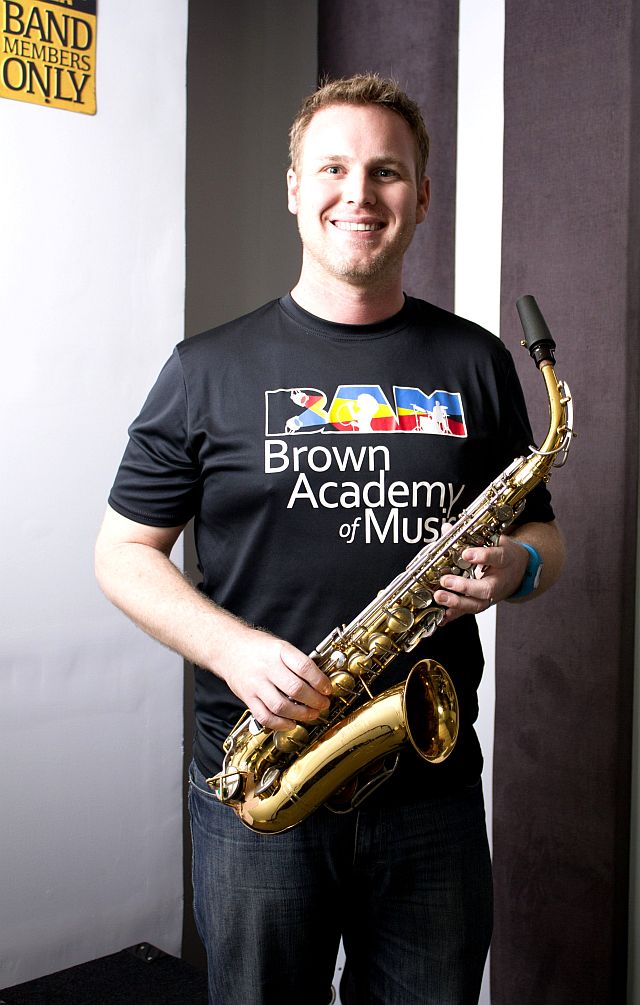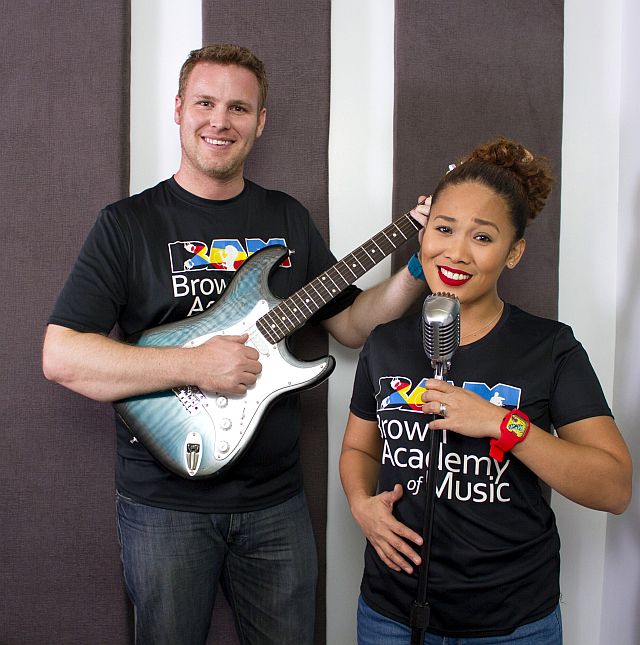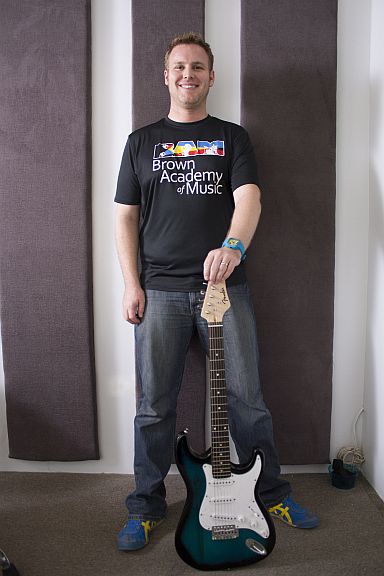
ADAM BROWN (CDN PHOTO/EDD BUENAVIAJE)
FOR SOMEONE who did not like to receive formal music training as a kid, but has later made the young generation of music enthusiasts appreciate its importance, Adam Brown, now the founder of Brown Academy for Music (BAM), sure knew how to hit the right notes.
BAM not only teaches their students how to perform, but also builds strong foundation for music careers learning from the basics to advanced level. Adam, a degree holder in Music Education, was a musical director for Royal Caribbean when he met his wife Anna Fegi, a Filipino international singer who also worked for the same cruise line at the time. Though they were assigned to different ships in their early years together, both knew that they were looking at the same direction. If Adam was to put it, they “sort of connected” naturally. That and their passion for music materialized their dream to build a school. And when Adam popped the big question, Anna’s “yes” was undeniably music to his ears.
After getting married and having traveled 60 countries, immersing themselves to different music cultures, the couple founded Brown Academy. The school, located at Northgate Centre in Banilad, Cebu, is one of the premiere sources of music education in the city. Adam and other teachers handle the music instruments while Anna teaches voice lessons.
The Play! pool was given a tour at the school where we caught Anna rehearsing the children for the academy’s first public performance on April 9 at The Terraces at Ayala Center. There will be special guests and surprises but no details were spilled. Well, it’s certainly is something to look forward to.
What was your first exposure to music?
I was 11 years old, and I started in a school band program. I played drums. Two years later they asked me to do things for other groups… perform, audition and stuff, so I was 13 when I knew that I wanted to do something in line with music. I thought teaching would be the one I wanted to do.
I kind of just knew that I wanted to be in a band. My dad played trumpet for less than six months, then he got braces… and that was his excuse to quit! (Laughs).
Why did you decide on drums?
I almost played trumpet when I started in a band because my dad tried that… but then all I had to do with drums is buy a pair of drumsticks and I practice that, so it was like the cheapest thing.
Was there a point when you felt like quitting?
No. I had very good teachers that made it very interesting. I was very lucky in high school and even in college.
What other musical instruments can you play other than drums?
My bachelor’s degree is in Music Education, so I had to go through and learn at least the very basic level of almost every band instrument, from flute, clarinet, oboe, bassoon, trumpet, French horn, trombone, euphonium, tuba. I had to take violin, violet, cello, bass, voice, piano lessons, and then I taught guitar also for five years.
How old were you when you started teaching music?
I was 22. Actually, I taught private lessons, one-on-one, like what we do here. I was 16 when I was teaching 12-year olds. I just did what I had done. I went to the same books. I’ve been through the process. I didn’t have a degree. They just needed someone to teach.
Did you volunteer?
Yes! I said whatever price you want! (Laughs). But I was happy. And then I taught in public schools in the US for five years when I was 22.
Is there anyone else in the family who’s into music?
Not so much. I started singing in church when I was really little. I had to stand on a chair. My grandma—it’s funny now I realized she’s really short—like I would stand on a chair to sing with her in church. It was just something I did. I didn’t know if it was an interest. My mom tried to make me play piano. I hated it and I quit! (Laughs).
Why didn’t you like it?
I liked to just plunk out notes, to learn by ear. I didn’t want to learn scales, and do all the exercises and stuff. I just wanted to learn how to play songs. I was lucky that my parents had a piano in our living room. I would hear a tune on TV or in a movie and I would just like to kind of learn to play it. I didn’t want a formal study in piano that time.
Tell us about your folks.
My mom played clarinet when she was in high school. She played piano and played through college. My dad was more into sports.
You were also into sports?
I played baseball, basketball, American football, soccer, but I knew I couldn’t be professional in them. The odds were against that! (Laughs). Once I started doing more of music, I thought, maybe this is something I can make a career out of. It was in high school when I had to give up sports. The older you get, the more intensive the schedule gets so I had to choose.
Any music personalities you look up to?
Because I was a drummer, it’s probably one most people never heard of… a guy named Dave Weckl, a fusion drummer playing with Chick Corea. My parents let me go to big clinic tours. These famous drummers would go around, and for the companies that they endorse such as drum companies or cymbal companies, they give clinics or workshops. I was able to do a lot of clinics, met professional musicians when they came through town.
It’s kind of something I want to try here now that more international groups are coming. It’s something we can possibly do here at the school.
How did Brown Academy come to be?
I met Anna five years ago. She’s from here, in Lutopan, and they didn’t really have a music school there. She had her dad teaching her, and she also had an elementary teacher, Tita Mila, who taught her voice, but anything else, she had to come to the city. She was always been very passionate to make a school.
She didn’t know at the time that my background was in teaching. We met while performing. She thought all I did was play drums, until I said my degree is Music Education. It was the first couple of weeks since we met. It wasn’t like, “Let’s get married and go start a school!” (Laughs).
We thought we’ll continue performing and traveling. And the school would be later down the road. But then the right opportunities presented itself.
The school is two months old. We opened in January. The good thing is that we were able to take two years and sit back and make plans. We had a huge mirror that was the size of a wall. We would make and write our plans. We talked about the curriculum, the kind of layout we want, the size of the rooms.

Adam and Anna Fegi-Brown, making beautiful music together. (CDN PHOTO/EDD BUENAVIAJE)
Tell us about your travels.
We came here in 2012. We got married and stayed here until 2013. Then we went back to ships. The last two years we’ve been traveling on cruise ships, from Asia to Europe to Africa. That’s 60 countries in two years. The whole point was to take some time away from Cebu. Let’s work. Let’s raise money. Let’s just travel and experience different cultures. Get ideas.
And how did it turn out?
When we were in Russia, we got into classical. Their top academy was like Tchaikovsky and all these classical names. When we were in Ireland, the musicians in the pubs played there. It was cool. We would take pictures and try to pick up a little of their culture. The passion in music is there, just in different ways. So for Brown Academy, we thought of in corporating little elements of everything.
How did you and Anna meet?
We met July 14, 2010. (Laughs). We had no interest in each other. (Laughs). She was dating somebody else. He was not there. She was a featured singer on the ship. I was already a musician on the ship, the drummer and musical director at the time. Right before my vacation was the launching of the brand new show she was in. I met her, we worked together, and that was really it. I went home, and came back. I didn’t know she broke up with the boyfriend, and then we started working together. They asked her to do more shows because she’s very talented and I was the musical director assigned to work with her. She’s very hardworking, and I think that was the time when we realized we’re very much the same.
You know, ship conversations are shallow. You complain about your boss, complain about this, so we started talking about families and where we came from, music and schools, much deeper topics, and that’s where the whole thing started.
So we met in July but didn’t start dating until December, and then she left for her vacation in January, and went to work on a different ship.
We were in a long distance relationship for eight months. We tried to visit each other whenever we can.

(CDN PHOTO/EDD BUENAVIAJE)
How did you propose?
After my vacation, I went back to my ship, she was on hers, and there were two days when our ships met up on the same port. That was in Barcelona when I proposed. We woke up and our ships are right next to each other! It was like a movie! (Laughs).
The Human Resources Manager of the ship was a friend of ours so they snuck me off the ship. I was the only crew allowed because she knew I had the ring. I had everything planned! The staff captain was a woman, which is rare, and kind of have the romantic side. They paged me to go to the office. They said, “You have five minutes. Get your stuff. Meet me back at the gangway and then you can go.”
I went. I proposed. I had about 15 minutes to celebrate and then I had to go back to my ship. (Laughs). But then four days later, we met up in another port close to Rome. And then long distance again and we finally got back together on the ship and then got married here.
Both of you are into music, which is cool. Do you also wish your children to take the same lead?
Only if they want to. If they want to do something else, we will support them. People ask if we want a boy or a girl. Well, as long as they’re healthy! (Laughs).
What are your long term plans for BAM?
We would love to expand. Anna is getting ready to put forth a new group that she’s working with. It’s a group of select voice students. Before she used to bring opening acts to help support some of her shows. She’s very hands-on like right now she’s doing a rehearsal with the kids teaching choreography and voice. She doesn’t handle the regular voice lessons. We have teachers doing the technical side and then now, she’s helping them performing, and getting them ready for a show.
What about this show?
We have a show on April 9th at the Terraces in Ayala Center Cebu. It’s at 6 p.m. About 40 students will perform. It’s probably going to be an hour- and-a-half. They’re going to play instruments and sing. There’ll be as young as six all the way to above 40. That’s our first big public show with this school. Anna is working from stage design and teaching choreography. We have some surprises and special guests that are coming.
Who are the guests coming to Brown Academy?
It’s a very good surprise.
Can you give a hint?
Well, we’re hosting a song writing workshop. The singers, once they get older, what’s the next step for them? They can write their own songs, to be an artist. So we are working with Jude Gitamondoc. He is the organizer of VisPop and wrote the song, “Hasula”. He is going to be here doing songwriting workshops for adults. We are going to run six sessions with three hours each so they get 18 hours with Jude.
What classes does BAM offer?
We teach voice, guitar, drums, keyboard, violin, saxophone, flute, trumpet, and we have a separate program that is children’s music which has two divisions. One starts as young as six months to two years. It’s actually for the parent or guardian as well.
It introduces how to use music in the house, for family bonding, make the family closer. Also, how to use music to soothe a crying baby.
The other is for three to five years old. That’s just for the child. It’s their first time to be in a classroom. Being away from their parents…tears in their eyes. But it’s good they already have an experience when they go to regular schools. It teaches all the fundamentals.
We also have much older students in their 20s and 30s. One is in his late 60s. Everybody learns from each other and they come from different places. It’s really cool.
How does your curriculum work?
Yes, the school is about performing. It’s about making them prepared for shows, but they have to learn the fundamentals and the techniques. We don’t skip that. The teachers here know how to read music instead of do it just by ear. The voice students are taught proper breathing and vocalizations. They learn how to sing, a little bit of music and dancing, how to play rhythm instruments, read basic sheet music. They can explore different instruments, not necessarily play all of them but learn about them, so when they get old enough they can choose because they already have a background. It gives them a headstart.
We also help them kind of diagnose instead of just fixing this. We find out what’s causing the problem and not just a quick fix like sing this, or no sing higher. It’s a little slower sometimes with the process to teach the technique but the end result is much better.
How do you handle it when a student loses interest?
You have to motivate the student to know that it’s a process. Some schools make it fun. Here’s your lyrics, here’s the melody, learn the song. They like that because it’s rewarding very quickly, but at the end of the day, the parents are paying for them to learn something. What’s sad is that I’ve seen students study the same pieces year after year, and they’re making the same problems. It’s like they start from A then B, then skip to M! It has to be a little deeper than that. We are a music school.
The first day we assess and check their voice range, their breathing and posture. We have to start back and really develop the proper technique.
What do most students enroll for?
A lot of our students are into voice. I think that goes back to the culture—a lot of singing here! (Laughs).
What songs take residence in your playlist?
Country music, rock, jazz, orchestra, really just about anything! If you’re always traveling, it’s hard to get news or listen to popular songs so I just try to catch up! (Laughs) I can’t be working with the younger generation and not know what’s going on! (Laughs).
What do you think of Taylor Swift?
Brilliant businesswoman. She understands in a way that’s down-to-earth. Her songs are very relatable to people. She writes about her life and what she experienced, which most people have experienced. What I like is that she doesn’t write things that she doesn’t know about. She’s not writing random stuff. She’s writing about high school romance, and crush on a boy, so as she gets older, she writes older topics.
What about The Carpenters?
Great band. Great song writing.
The Beatles?
Before all these bands, there was The Beatles. If they hadn’t existed, I don’t know what music now would have been like. They kind of made it up as they went along and set the standard for how things are done.



